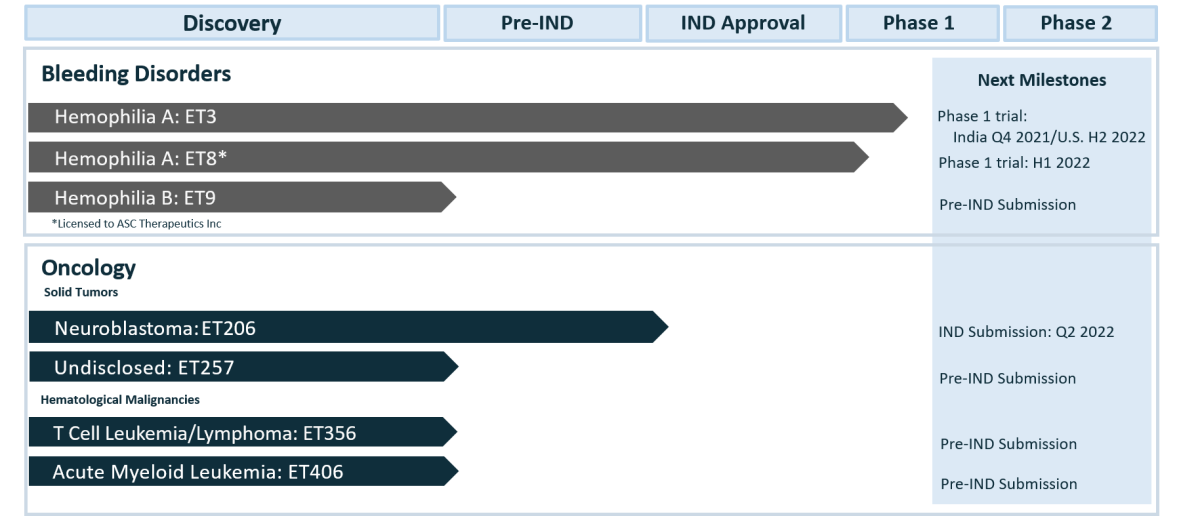TECHNOLOGY
Expression Therapeutics has developed several engineering platforms to enable the development of novel gene therapies. Our ‘expression’ cassette optimization technology, termed ECO, utilizes bioinformatics and artificial intelligence to predict optimized transgene expression cassettes. ECO optimized sequences combine target cell type and context-aware cassette optimization for enhanced expression and therapeutic efficacy.
The key to ex vivo gene therapy is effective selection and manufacturing of the engineered cell product. In the case of inherited genetic disorders, where lifelong production of therapeutic protein is required, our hematopoietic stem and progenitor (CD34+) cell platform has the capacity to self-renew and re-populate the blood cell compartment for life. However, in the case of cancer therapy, lifelong survival of the cellular gene therapy may not be optimal due to off-tumor effects. For this reason, Expression Therapeutics has developed a gamma delta (γδ) T cell therapy platform that provides potent short-term cancer-specific cytotoxicity and relapse prevention without the risk of long-term persistence and damage to otherwise healthy tissue.
THERAPEUTIC PIPELINE
Our therapeutic pipeline includes novel gene therapies for hemophilia A, hemophagocytic lymphohistiocytosis (HLH), neuroblastoma, leukemia/lymphoma.
Hemophilia A is an inherited bleeding disorder caused by the deficiency of blood clotting factor VIII (FVIII). Without treatment, severe hemophilia A is crippling and fatal by late adolescence to early adulthood. Existing treatment consists of FVIII infusion products that are administered under intensive regimens involving intravenous infusion several times a week. Expression Therapeutics is developing a best-in-class curative therapy for hemophilia A.
Our lead product for hemophilia A is an ex vivo hematopoietic stem cell (HSC) LV gene therapy that works with cells derived from the patient (“autologous” cells). For this therapy, white blood cells are harvested from the blood of a patient through a process called apheresis. Then, in the laboratory, hematopoietic (blood) stem and progenitor cells are enriched through a process termed CD34+ selection. Subsequently, the CD34+ cells are genetically modified (transduced) using our proprietary LV-FVIII vector and then transplanted back into the patient via a simple peripheral vein infusion. The CD68-ET3-LV CD34+ cell product functions by engrafting back into the stem cell compartment within the bone marrow and resuming its normal function of blood cell production. Following the genetic modification procedure, these millions of daughter blood cells now provide a continuous supply of functional FVIII to the bloodstream.
Hemophagocytic lymphohistiocytosis (HLH) is a devastating immune disorder in which the activated immune cells accumulate and attack other blood cells. There are two forms of the disorder: familial and acquired. Currently, treatment options are limited, and the long-term outlook remains poor. Expression Therapeutics is developing autologous gene therapy for HLH that incorporates LV gene transfer of expression optimized HLH transgenes. This mode of therapy has the potential to provide a lifelong cure to patients and families who otherwise have little hope.
Neuroblastoma is a type of childhood cancer that often originates from one of the adrenal glands and has usually already spread at the time of diagnosis. Neuroblastoma overwhelmingly occurs in children under 5 years of age. Long term survival rates for children who fall into a “high-risk” version of this disease are less than 40 percent, despite aggressive treatment with high-dose chemotherapy, surgery, radiation, or immunotherapy. Expression Therapeutics is developing a gamma delta (γδ) T cell therapy that, when used in conjunction with standard of care chemotherapy and immunotherapy, effectively eradicates neuroblastoma tumor cells.
Chimeric antigen receptor (CAR) T cell therapies are demonstrating success in the treatment of B cell cancers. However, the adaptation of this platform to other liquid and solid tumors has proven more challenging. Expression Therapeutics has developed novel gene therapy strategies to overcome these challenges utilizing mRNA technology to engineer γδ T cells with novel CAR-designs. The initial indications include B/T-cell leukemia/lymphoma and acute myeloid leukemia (AML).
Stage of development

